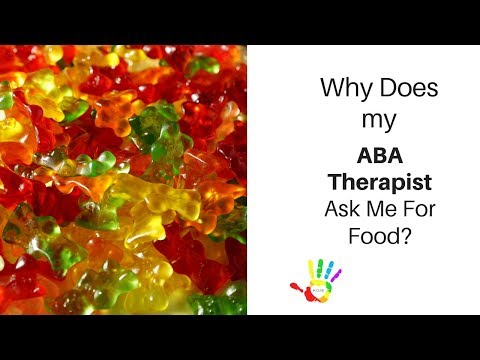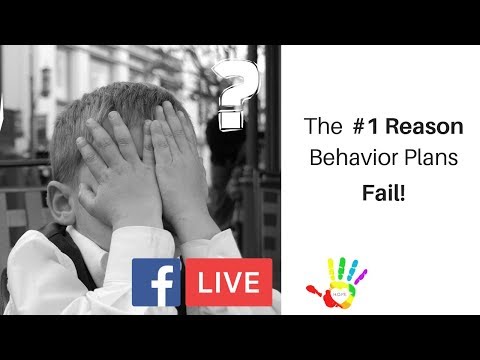In tonight’s video, i will answer the question every parent eventually asks their ABA therapist. Why does my therapist ask for food!
Enjoy and email your questions to Jessica@Jessicaleichtweisz.com
Credits:
Photo: Morguefile
Sound effect: Incomputek
Intro: Graeme Kan
Video Production: Nathan Bedford
Disclaimer:
This video is intended for information purposes only. It is not intended to diagnose or treat any medical condition. The text, graphics, images, flash movies, and audio segments are not intended to be a substitute for professional medical advice, diagnosis, or treatment. Always seek the advice of your physician or other qualified health provider with any questions you may have regarding a medical condition.
The information contained in this segment is generalized. It may not be applicable in every situation. Before applying specific interventions, consult a behaviorist. Any behavior intervention can result in an undesired change in behavior if not implemented correctly. No client relationship is established as a result of watching these videos. Jessica Leichtweisz and Hope Education cannot be held responsible for any misuse of the information contained in these videos. <br> <h3>Auto Generated Captions</h3>
[Music]
hey guys and welcome back so tonight
what I’m gonna do is I’m gonna answer a
question that many many parents asks so
oftentimes what I do is I lead out teams
of therapists so many times when I get
in I get the same exact question over
and over for parents and so what I
wanted to do is shoot a video about it
because I know it’s probably a question
you’re asking too so that question is
why is my ABA therapists always asking
for food so you probably know already if
not you can check back at some of the
previous videos we’ve launched that in
ABA we reinforce behavior that we want
to occur more often so a lot of times
that is in the form of a food and edible
reinforcer so why are we asking for food
why are we why can’t we use something
else that’s a really great question
there are two types of reinforcers
primary reinforcers and secondary
reinforcers a primary reinforcer is
something that someone doesn’t have to
learn is good for kids that’s food and
water for adults it’s food water and sex
so for kids especially kids that are on
the spectrum a lot of times these are
going to be the most powerful
reinforcers now secondary reinforcers
are things that we know where we learn
along the way that they’re good that can
be a favorite toy and ultimately we want
it to be social praise the big goal of
what ABA is is that we’re teaching kids
to engage in behaviors that are socially
reinforced in their environment but in
the beginning the behaviors we’re asking
the kids to do are really really hard
for them we may not think it is we might
just be sitting there and holding up a
flashcard and saying what is it but for
a kid that’s learning to talk that can
be a really really challenging task
so what we want to do is we want to use
the most effective reinforcer a
reinforcer is anything that a child
wants so the more that they want
something the more likely they’re
gonna be to engage in a behavior to get
it food doesn’t have to be the only
thing that’s used if a child has a
really powerful learned or secondary
reinforcer we can use that many times
the iPad is a really big secondary
reinforcer
however there’s two issues number one a
lot of times kids with autism don’t
develop them as quickly as other
children we know that many times
children who are on the spectrum they
lack play skills so if you give them a
toy they may not know what to do with it
the second problem with giving something
like a toy to a child is that it has to
be then taken back and unless a child
has compliance unless the child
understands they’re going to get that
item back again it can create more
behavior problems so oftentimes what a
therapist is looking for is a small
piece of food that they can give a child
that they consume easily it doesn’t have
to be taken away so that really creates
an ideal situation because we know that
the kids want it we know it’s going to
be powerful and reinforcing and we also
know that we’re not going to have to
worry about what happens if we withdraw
it they’re just going to eat it there
are a few things to keep in mind if you
do choose to go the route of using food
number one it should be small and it
should be something that is easily eaten
the second thing is we have to make sure
that it is healthy for the kids we don’t
want to be constantly giving them things
that are not healthy for them so you the
preference should always be using
healthy snacks and like anything else we
should be doing it in moderation another
thing that you can do is you can save
snacks for in therapy sessions that also
will create a desire for the behavior a
more we call it an ego or an existing
operation or establishing operation in
in ABA terms that we want the children
to really really want it we’re not
asking you to starve your kids or to not
feed them but just withhold their
favorite snack and keep it just in the
ABA sessions and that’s what really is
going to make it most effective and most
likely the children are going to be
successful and willing to engage in the
behave
if you’re sitting there and saying
listen you know what I hear all that but
no matter what I’m not okay with using
food that’s your choice what you can do
is you can ask the therapist to do a
preference assessment we’re gonna do a
video about what that is in a few weeks
so you can stay tuned there’s many types
of preference assessments and what that
can do is figure out if there is a
secondary reinforcer that can be used
and you can ask the therapist to teach a
secondary reinforcer or to create a
secondary reinforcer through something
called pairing which again we’ll cover
in a few weeks so those are my tips for
tonight thank you so much for sending
these questions in I really want to help
you so if you have any questions at all
there’s anything you want to ask me feel
free to reach out my emails Jessica at
Jessica likewise comm I’ll do my best to
create a video just like tonight to get
your questions answered god bless and
make it a great night
[Music]
you
[Music]
Why does my ABA therapist ask me for food? PE8ppYxG4iw
[Music]
hey guys and welcome back so tonight
what I’m gonna do is I’m gonna answer a
question that many many parents asks so
oftentimes what I do is I lead out teams
of therapists so many times when I get
in I get the same exact question over
and over for parents and so what I
wanted to do is shoot a video about it
because I know it’s probably a question
you’re asking too so that question is
why is my ABA therapists always asking
for food so you probably know already if
not you can check back at some of the
previous videos we’ve launched that in
ABA we reinforce behavior that we want
to occur more often so a lot of times
that is in the form of a food and edible
reinforcer so why are we asking for food
why are we why can’t we use something
else that’s a really great question
there are two types of reinforcers
primary reinforcers and secondary
reinforcers a primary reinforcer is
something that someone doesn’t have to
learn is good for kids that’s food and
water for adults it’s food water and sex
so for kids especially kids that are on
the spectrum a lot of times these are
going to be the most powerful
reinforcers now secondary reinforcers
are things that we know where we learn
along the way that they’re good that can
be a favorite toy and ultimately we want
it to be social praise the big goal of
what ABA is is that we’re teaching kids
to engage in behaviors that are socially
reinforced in their environment but in
the beginning the behaviors we’re asking
the kids to do are really really hard
for them we may not think it is we might
just be sitting there and holding up a
flashcard and saying what is it but for
a kid that’s learning to talk that can
be a really really challenging task
so what we want to do is we want to use
the most effective reinforcer a
reinforcer is anything that a child
wants so the more that they want
something the more likely they’re
gonna be to engage in a behavior to get
it food doesn’t have to be the only
thing that’s used if a child has a
really powerful learned or secondary
reinforcer we can use that many times
the iPad is a really big secondary
reinforcer
however there’s two issues number one a
lot of times kids with autism don’t
develop them as quickly as other
children we know that many times
children who are on the spectrum they
lack play skills so if you give them a
toy they may not know what to do with it
the second problem with giving something
like a toy to a child is that it has to
be then taken back and unless a child
has compliance unless the child
understands they’re going to get that
item back again it can create more
behavior problems so oftentimes what a
therapist is looking for is a small
piece of food that they can give a child
that they consume easily it doesn’t have
to be taken away so that really creates
an ideal situation because we know that
the kids want it we know it’s going to
be powerful and reinforcing and we also
know that we’re not going to have to
worry about what happens if we withdraw
it they’re just going to eat it there
are a few things to keep in mind if you
do choose to go the route of using food
number one it should be small and it
should be something that is easily eaten
the second thing is we have to make sure
that it is healthy for the kids we don’t
want to be constantly giving them things
that are not healthy for them so you the
preference should always be using
healthy snacks and like anything else we
should be doing it in moderation another
thing that you can do is you can save
snacks for in therapy sessions that also
will create a desire for the behavior a
more we call it an ego or an existing
operation or establishing operation in
in ABA terms that we want the children
to really really want it we’re not
asking you to starve your kids or to not
feed them but just withhold their
favorite snack and keep it just in the
ABA sessions and that’s what really is
going to make it most effective and most
likely the children are going to be
successful and willing to engage in the
behave
if you’re sitting there and saying
listen you know what I hear all that but
no matter what I’m not okay with using
food that’s your choice what you can do
is you can ask the therapist to do a
preference assessment we’re gonna do a
video about what that is in a few weeks
so you can stay tuned there’s many types
of preference assessments and what that
can do is figure out if there is a
secondary reinforcer that can be used
and you can ask the therapist to teach a
secondary reinforcer or to create a
secondary reinforcer through something
called pairing which again we’ll cover
in a few weeks so those are my tips for
tonight thank you so much for sending
these questions in I really want to help
you so if you have any questions at all
there’s anything you want to ask me feel
free to reach out my emails Jessica at
Jessica likewise comm I’ll do my best to
create a video just like tonight to get
your questions answered god bless and
make it a great night
[Music]
you
[Music]
https://i.ytimg.com/vi/PE8ppYxG4iw/hqdefault.jpg Autism,ABA,Behavior,Pyschology,ABA Therapy,Applied Behavior Anlysis,Applied Behaviour Analysis,Education,Sepecial education,hope education services,Jessica Leichteweiz,Autism Spectrum disorder,asd,autistic,autism traits,autism facts,facts about autism,rbt competency exam,videos about autism,autism videos,aba therapist,autism treatment,treatment for autism,autism therapy,aba reinforcement ideas,autism reinforcement,aba terms In tonight’s video, i will answer the question every parent eventually asks their ABA therapist. Why does my therapist ask for food!
Enjoy and email your questions to Jessica@Jessicaleichtweisz.com
Credits:
Photo: Morguefile
Sound effect: Incomputek
Intro: Graeme Kan
Video Production: Nathan Bedford
Disclaimer:
This video is intended for information purposes only. It is not intended to diagnose or treat any medical condition. The text, graphics, images, flash movies, and audio segments are not intended to be a substitute for professional medical advice, diagnosis, or treatment. Always seek the advice of your physician or other qualified health provider with any questions you may have regarding a medical condition.
The information contained in this segment is generalized. It may not be applicable in every situation. Before applying specific interventions, consult a behaviorist. Any behavior intervention can result in an undesired change in behavior if not implemented correctly. No client relationship is established as a result of watching these videos. Jessica Leichtweisz and Hope Education cannot be held responsible for any misuse of the information contained in these videos.



